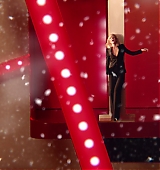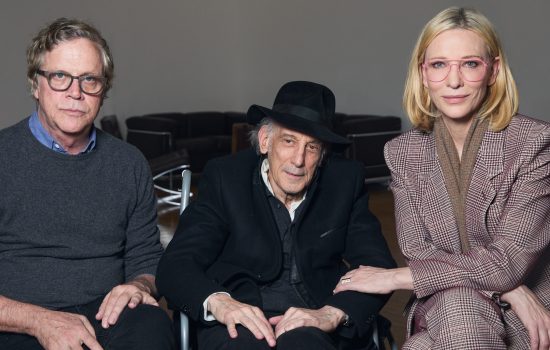Guillermo Del Toro’s Pinocchio is now out on Netflix. Cate Blanchett voiced the monkey, Spazzatura. The movie is accompanied by a 30-minute behind-the-scene look on the stop-motion animated film.
There is a longer version of the Armani Beauty Holiday advert that you can watch below.
Cate talked to The Times ahead of the UK release of TÁR next month. Her performance in TÁR made it to several publications’ “Best Performance in 2022” list. You can read the commentaries from the publications below.
Noora Niasari’s feature debut, Shayda, is part of World Cinema Dramatic Competition lineup at 2023 Sundance Film Festival. The film is produced by Dirty Films, with Cate Blanchett and Andrew Upton as executive producers.






Cate Blanchett’s towering performance in TÁR in various publications’ “Best Performance of 2022” list
TIME — Todd Field’s Tár is hard to pin down: is it an exploration of the pigheaded dedication it takes to be a great artist, a celebration of all that art can mean to us, or a wicked extended gag about human selfishness? It’s all three of those things, and more, but through it all there’s no looking away from Cate Blanchett as the world-class orchestra conductor Lydia Tár. She’s the film’s resplendent center, its sun queen. Tár is about the invention, and subsequent unraveling, of a self. Blanchett’s Lydia glides through every phase until she hits what’s either a desperate nadir or the first stirrings of a rebirth—who knows which? Blanchett gives nothing away easily, though she keeps us close every step of the way, even if we need to run a little bit to keep up with her. In the end we’re not her audience; we’re her accomplices.
Los Angeles Times — For an actor who has incarnated English and Elvish royalty, impersonated Bob Dylan and Katharine Hepburn, and won an Oscar for channeling Ruth Madoff by way of Blanche DuBois, the role of a world-famous classical conductor might not seem the height of difficulty. But difficulty, always a misleading measure of acting greatness, has nothing to do with Lydia Tár’s allure. Plenty of actors could have studied piano, conducting and German to the level of technical fluency Blanchett achieves here; few could have invested Lydia Tár with the same otherworldly magnetism. This towering musical genius and ruthless manipulator comes to us fully formed; we hang on her every public and private word, her every flick of the pen and baton. And as Lydia’s world begins to crumble and her hold on reality falters, Blanchett somehow pulls us closer still, refusing to soft-pedal the character’s monstrosity — or her magnificence.
The New Yorker — There’s a reason that the once renowned, later disgraced, completely fictitious conductor Lydia Tár is talked about like a real person, at least in certain Twitter circles. Actually, there are two reasons: Todd Field’s note-perfect screenplay and direction, and Blanchett’s transfixing performance as the woman herself, a classical-music luminary brought low. Blanchett’s superpower is her self-possession, which, in films such as “Blue Jasmine” and “Carol,” she has used to show what happens when high-status women are forced to find new strategies to survive. “Tár” features her in one of her best modes—toxic diva—but the character feels like an entirely new creation. Blanchett’s velvety voice, shrewd eyes, and domineering intelligence seduce us—until we come to realize that Tár’s unravelling is a long time coming. “Tár” may have opened in October, but it feels as if Lydia Tár has been here all along.
IndieWIre — As a conductor who orchestrates her own undoing in “TÁR,” Cate Blanchett gives her career-best performance since she told Therese Belivet “I like the hat” in “Carol” seven years ago. Her Lydia Tár, here the most famous female conductor in the world, allows Blanchett to dig into the sinews of her gifts while also reflecting on her own public-figure status and genius.
Lydia’s interpersonal dealings with protégés, peers, fans, and colleagues become her inevitable destruction. Todd Field’s movie unfolds as a breakdown of the Lydia persona — and quite possibly of Blanchett’s as well, as the character attempts to triage her shattering public image. Field wrote the movie for Blanchett, and it’s easy to understand why: she is never less than absolutely riveting whether chewing out a Juilliard student for what she perceives is his inability to “sublimate” himself to his craft, or approaching a small girl in a schoolyard and telling her “I’ll get you” because she’s been rude to Lydia’s daughter.
The last half hour, especially, is a showcase for Blanchett as the Lydia mask slips off and “Linda” is revealed. The movie leaves you uneasy about where either one’s legacy ends up. But one thing you’re absolutely sure of walking away from “TÁR”? It’s one of the greatest performances ever filmed.
The Ringer — Often, we praise performances for their transformation—the character’s perceived distance from the performer’s everyday self. The beauty of Lydia Tár is how much she resembles Cate Blanchett. A widely lauded master of her distinctly highbrow craft, Tár spends her days shuttling between podcast tapings and New Yorkersymposia; Blanchett herself occupies the same milieu. Which may be how the actress makes the conductor a master class in ego gone awry. Lydia is essentially Cate with an ethnomusicology degree, a queer marriage, and a willingness to internalize her own hype. (Even Tár’s sexuality isn’t that much of a stretch, given Blanchett’s prior work in films like Carol.) Even before we learn exactly how Tár has abused the power that comes with her position, we can see her enjoy herself a little too much when browbeating a grad student or teasing an assistant with a potential promotion, a temptation Blanchett herself has surely entertained. That Tár is a genuine talent only emphasizes her tragedy. She’s a genius whose creation, by Blanchett in conjunction with writer and director Todd Field, is itself an act of genius. It’s become a tongue-in-cheek meme that Lydia Tár is a real person, a joke that’s plausible only because watching her demands no suspension of disbelief.
THR — JON FROSCH: Then there’s Cate Blanchett. She sometimes defaults to a kind of grandness that can make her performances collectively feel a bit homogenous. But when Blanchett connects, there are few in her league. Lydia Tár, the revered, then disgraced, conductor in Todd Field’s dazzlingly dense and immersive drama, is a towering creation — one of those sublime cases of alchemy between actor and role. Lydia’s contradictions are infuriating. But, as played by Blanchett, they’re also uncomfortably coherent, if that makes sense. We understand Lydia — and get caught up in her frightening swirl of power and human weakness — perhaps more than we want to admit.
LOVIA GYARKYE: Blanchett is electric in Tár. I can’t think of a better description of her performance than “uncomfortably coherent.” The portrayal feels almost conspiratorial, as if performer and character are scheming to unnerve an already apprehensive viewer. That heightens the experience of witnessing Lydia tumble as she loses both her status and self-control. Watching it all unfold feels like a steady inhale followed by a rapid, relentless exhale.
DAVID ROONEY: Blanchett can be too theatrical for my taste — I wasn’t a fan of her Oscar-winning Blanche DuBois riff in Blue Jasmine — but I was transfixed by every second of her forensic work here. I also love how Blanchett’s magisterial pyrotechnics are offset by scrupulously contained turns from Nina Hoss, as Lydia’s patient wife and colleague, whose loyalty dissolves when she’s treated with disrespect; and Noémie Merlant as the assistant who observes and archives each transgression.
FROSCH: So we all agree Blanchett deserves every prize handed to her.





 A Manual for Cleaning Women (202?)
A Manual for Cleaning Women (202?) Father Mother Brother Sister (2025)
Father Mother Brother Sister (2025)  Black Bag (2025)
Black Bag (2025)  The Seagull (2025)
The Seagull (2025) Bozo Over Roses (2025)
Bozo Over Roses (2025) Disclaimer (2024)
Disclaimer (2024)  Rumours (2024)
Rumours (2024)  Borderlands (2024)
Borderlands (2024)  The New Boy (2023)
The New Boy (2023) 











